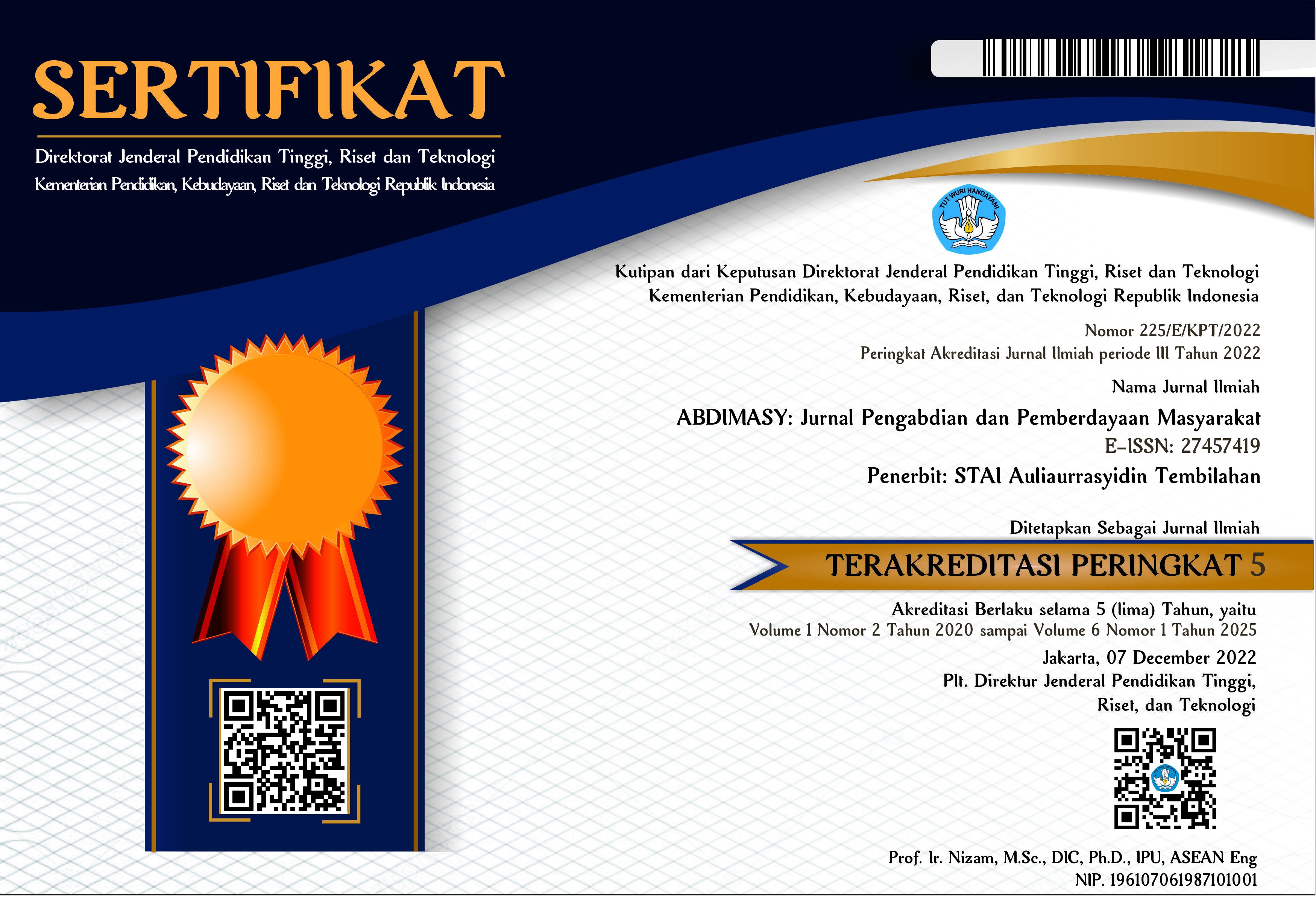Pembiasaan Membaca Teks Arab Gundul dengan Kitab Al Nahwu Al Wāḍih di Pondok Pesantren Manbaul Husna Kabupaten Banyumas Jawa Tengah
DOI:
https://doi.org/10.46963/ams.v4i2.1195Keywords:
Arab Gundul Text, Al Nahwu Al Wadhih, Islamic Boarding SchoolAbstract
The background to this community service is the lack of time to study “Arab Gundul” texts at the Manbaul Husna Islamic Boarding School in Purwokerto, even though Arabic language skills are one of the main abilities of a santri. The aim of this community service is to optimize Arabic language learning by accustoming students to reading b”Arab Gundul” texts with the book al nahwu al wadhih. Arabic language learning in Islamic boarding schools can generally be carried out well because the material is delivered through theory and practice. However, in the context of student Islamic boarding schools, Arabic language practice is less than optimal because the students' study time is limited. In this context, the habit of reading “Arab Gundul” texts is useful for optimizing students' Arabic language skills because by reading “Arab Gundul” texts, students learn mufradat, nahwu, nerve, as well as tarjamah. The result of this community service activity was the implementation of the reading habitual activity of “Arab Gundul” texts with the book al nahwu al wadhih for the students of the Manbaul Husna Islamic Boarding School, Purwokerto, for eight meetings. Meanwhile, the findings obtained were an increase in students' skills in reading Arabic texts using the correct nahwu rules.
Downloads
References
Al Jarimi, Ali. (1956). Al Nahwu Al Wāḍih. Mesir: Daar Al-Maarif.
Aziza, Lady Farah. (2020). Ketrampilan Berbahasa Arab dengan Pendekatan Komprehensif. Jurnal El Tsaqofah Vol 19 Nomor 1.
Nurhakim, Moh. (2011). Imam Zarkasyi dan Pembaharuan Pesantren: Rekonstruksi Aspek Kurikulum, Manajemen, dan Etika Pendidikan. Jurnal Progresiva, Volume 5 Nomor 1.
Rivai, Alimudin, dkk. (2021). Pembiasaan Berbahasa Arab Melalui Lingkungan Berbahasa di Pondok Pesantren Assalam Manado. Jurnal Tarsius, Volume 3 Nomor 2.
Rosyadi, Sabila dan Alim, Akhmad. (2022). Program Pembiasaan Bahasa Arab di MTs Pondok Pesantren Al-Ma’tuq Sukabumi. Tawazun: Jurnal Pendidikan Islam, Volume 15 Nomor 3.
Saepudin. (2012). Pembelajaran Ketrampilan Berbahasa Arab: Teori dan Aplikasi. Trust Media.
Sayono, Joko. (2010). Historiografi Pesantren: Perspektif Metodologis Antara Ada dan Tiada. Jurnal Sejarah dan Budaya Volume 1 Nomor 1.
Steenbrik, Karel. A. (1986). Pesantren, Madrasah, Sekolah: Pendidikan Islam pada Kurun Modern. Jakarta: Dharma Aksara Perkasa.
Sudiarti, Sri. (2015). Peningkatan Ketrampilan Membaca Teks Arab Gundul Melalui Aktivitas Membaca Intensif Berbasis Gramatikal: Studi Kasus Mahasiswa Bahasa dan Sastra Arab IAIN STS Jambi. Jurnal Fenomena, Volume 7 Nomor 1.
Syarifah dan Juriana. (2021). Pembelajaran Bahasa Arab di Pesantren Al-Islam dan Darul Abror (Antara Tradisional dan Modern). Jurnal Edugama, Volume 6 Nomor 2.
Ulfah, Maria. (2021). Metode Menghafal Al-Qur’an di Pondok Pesantren Istana Al-Qur’an Sirrul Asror Buaran Jakarta Timur. Skripsi UIN Syarif Hidayatullah Jakarta.
Downloads
Published
Issue
Section
License
Copyright (c) 2023 Fahri Hidayat, Arif Rahman

This work is licensed under a Creative Commons Attribution-ShareAlike 4.0 International License.
Authors who publish with this journal agree to the following terms:
1. Copyright on any article is retained by the author(s).
2. The author grants the journal, right of first publication with the work simultaneously licensed under a Creative Commons Attribution shareAlike 4.0 International License that allows others to share the work with an acknowledgment of the work’s authorship and initial publication in this journal.
3. Authors are able to enter into separate, additional contractual arrangements for the non-exclusive distribution of the journal’s published version of the work (e.g., post it to an institutional repository or publish it in a book), with an acknowledgment of its initial publication in this journal.
4. Authors are permitted and encouraged to post their work online (e.g., in institutional repositories or on their website) prior to and during the submission process, as it can lead to productive exchanges, as well as earlier and greater citation of published work.
5. The article and any associated published material is distributed under the Creative Commons Attribution-ShareAlike 4.0 International License





2.png)



